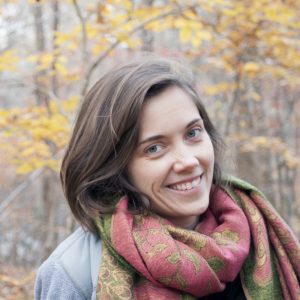
Hannah Jacobs was the primary organizer of the Triangle Digital Humanities Institute on DH Pedagogy earlier this year. She works at the Duke Wired! Lab as a digital humanities specialist who helps faculty and students with consultations, project development, and technical support. As a significant emerging figure in digital humanities (not just in the triangle but in the field as a whole) we wanted to get her thoughts on the state of digital humanities and its future. Hannah holds an MA in Digital Humanities from King’s College London (2014) and a BA in English/Theatre from Warren Wilson College (2011). She is currently completing an MSIS at UNC Chapel Hill.
How did you first learn about digital humanities? And what lead you to pursue a career in digital humanities?
I first learned about digital humanities when I started working for the John Hope Franklin Humanities Institute (FHI) at Duke in 2011. I was fresh out of my undergraduate program (Theatre/English at Warren Wilson College) and was assisting with events management at FHI. The FHI Humanities Labs were just getting off the ground, and we were hosting invited speakers like Tara McPherson, Erik Loyer, and Alan Liu. I was the proverbial fly on the wall.
I had spent four years at Warren Wilson coming to understand the value of work as education and, while I knew I wanted to continue studying humanities, was looking for a way to incorporate this “learning by doing” into my graduate study. I was fascinated by the “hack vs. yack” debates that, having simmered for years, had recently been broken wide open. At that time, there was only a handful of universities with digital humanities graduate programs. I chose to attend King’s College London and received an MA in Digital Humanities in 2014.
At King’s I was introduced to a full range of digital humanities methods and became especially interested in visualization methods as scholarly communication, which I incorporated into my Master’s thesis. Around the time that I was finishing the thesis, a position with the Wired! Lab for Digital Art History and Visual Culture became available. This job has enabled me to follow that interest in visualization across platforms, mediums, and areas of study as I support and collaborate on faculty and student projects. And the line between hacking and yacking, and what counts as “intellectual” or “scholarly” work, continues to be a daily reflection for me.
How did you conceive of the digital humanities pedagogy institute?
A significant part of my job involves working with Wired! Instructors and students in the classroom. I consult on the design of digital project assignments, teach digital methods and literacies, troubleshoot technical issues, and critique student projects. Another aspect of my role involves outreach to other humanities labs and units supporting digital humanities on campus.
About a year ago, I recognized a need on campus to offer more opportunities for knowledge sharing around pedagogy. The most recent dh pedagogy event at Duke at that point had been a 2014 panel. I pitched the idea for an afternoon panel or day-long symposium to Paul Jaskot (Director of the Wired! Lab) and Victoria Szabo (Director of Information Science + Studies and the Duke Digital Humanities Inititiative), and they were both supportive. Then the end of the semester happened, and the summer, and I put it on the back burner.
In September 2018, the National Humanities Center hosted a Digital Humanities Nuts & Bolts Symposium, a day that brought together instructors, scholars, technologists, librarians, and students from across the Triangle. I was inspired by the community I saw forming, was aware of the renewed initiative to build the Triangle Digital Humanities Network and the Triangle Digital Humanities Institutes, and wanted to offer a follow up event that could continue the momentum begun at the NHC. I thought that the event would become more valuable if those involved in pedagogy across the Triangle could share with one another. I revised my initial idea and proposed it to Nathan. He said yes, and the rest, as they say, is history.
What were the biggest takeaways from the event?
My biggest takeaways are based on the participants themselves:
The TDHI on DH Pedagogy really highlighted the range of digital humanities practices and pedagogies taking place in the Triangle and broader southeast region. Our local speakers and workshop facilitators represented four area universities (Duke, NCCU, UNC-CH, and NC State) and represent the full spectrum of humanities disciplines. Although I had an idea of this, it wasn’t until we started organizing the event that this became apparent.
Our guest speaker, Diane Jakacki, opened the day by asking “Why Teach DH?” and highlighting her alt-ac role in digital humanities pedagogy. While I also fill this kind of role, I had not expected to find so many others in non-faculty positions in attendance. It’s brought me to question who the faces of digital humanities pedagogy really are in the Triangle, and who are driving the development of digital humanities pedagogies? Certainly some of them are tenured, tenure-track, and adjunct faculty, but many of them are staff and graduate students who are shifting their field’s modes of instruction, working in positions that did not exist 10 years ago, and influencing larger conversations around dh pedagogy’s scalability, accessibility, and applicability. It strikes me that the next conversations around dh pedagogy in the Triangle, and across the US, need to focus on who these people are, the (sometimes/often invisible) work they are doing to bring dh into the classroom, and just how much they are changing the underlying structures of teaching in higher education.
Whose work most energizes or informs your own?
I’d have a hard time picking one person. I was deeply inspired by the presenters at this roundtable on Teaching and Researching the Early Modern with with Digital Tools at the most recent Renaissance Society of America gathering. Many of these scholars have been working in dh for a long time, have found ways to do it when it appeared impossible, have invented a variety ways to incorporate their dh work into their teaching and mentoring, and have done so in a variety of supportive and unsupportive institutional contexts.
Lately, I have also been inspired by reading and listening to Danica Savonick and Kim Gallon, intellectuals who are bringing much needed critical social and historical depth to digital humanities and dh pedagogy.
What area of DH are you most excited about right now?
There is a lot of interesting work around public digital humanities and local histories happening right now. Scholarly and local communities are coming together in new and different ways to connect issues of the past to the present–especially as we grapple locally with crises in housing, public transportation, immigration, incarceration, and climate. I am most excited about dh that reaches out and brings in: dh projects that are community driven, meet an immediate need, combine digital and physical modes of communication, and/or whose research connects student learning with community memory (see also).
What is your dream DH project?
I keep a running list in my head of projects that I’d work on if time and money were no object. Most of them are oriented toward histories and geographies of the American South. As the Triangle area is changing rapidly again, there are many opportunities for dh to help us remember its histories, connect across communities, and think critically about where we are going as a region. A lot of that work is already happening, and I’m thrilled to be able to watch it, engage with it, and contribute to small portions of it.
